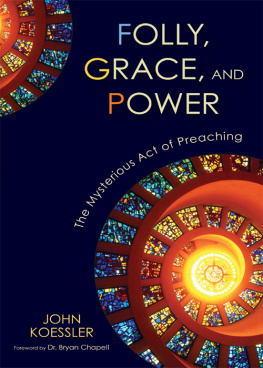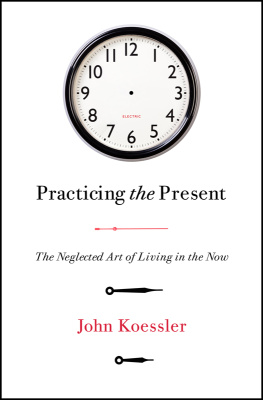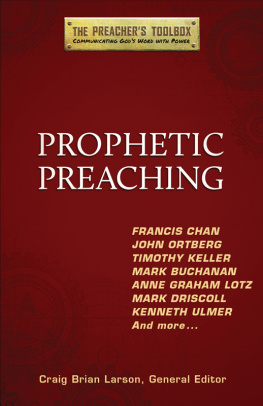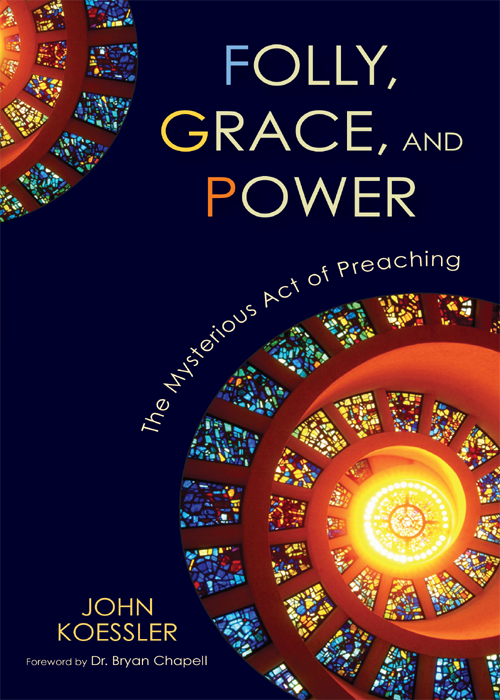E very veteran preacher knows the experience: you have just preached the sermon that you are sure will send the elders board scurrying to nominate a pulpit committee to find your replacement. You also wonder how you could have managed to be so dull and so lacking in insight or inspiration. You went through the motions of preaching, but there was no fire in your gut and no joy in your performance. Afterward, you stand at the rear door of the sanctuary thirsty for the regulars to give their clichd and halfhearted, Good sermon, pastor. Though the words usually turn your stomach, you know that today these forced courtesies will provide the only drops of hope that there is any reason for you ever to return to the pulpit. But then, extended from the line of limp handshakes, comes a hand that takes yours with an energy that seems determined to reach into your heart. Teary eyes meet yours and a grateful voice says, Pastor, how did you know just what to say to ease my pain? I had given up hope, but you have given me reason to live again. Thank you for that word from God.
Of course, the opposite can occur. You imagine that the sermon you have just preached will surely qualify for the next anthology of messages meant to identify the modern successors of Whitfield and Spurgeon. But then, while your thumbs grow red from being hooked behind suspenders stretched taut by a chest puffed with pride, the line of parishioners passes in silence. No one mentions the oratorical masterpiece they have just heard, and your ego deflates as rapidly as your estimation of the judgment of your listeners. All you know for certain is that this preaching business is a mystery. Something beyond natural processes governs the way the human heart receives Gods Word.
The apostle Paul confirms the mystery when he relates that natural humanity those persons in whom the Spirit of God is not working hears the truths of the gospel as foolishness and cannot understand its significance. Paul writes, The natural person does not accept the things of the Spirit of God, for they are folly to him, and he is not able to understand them because they are spiritually discerned (1 Cor. 2:14 ESV).
Natural reason, natural inclinations, and human nature will reject the gospel unless some force beyond human reason, instinct, and nature gets involved. The message that, despite our sin, we can be reconciled to a holy God by faith in a Savior who rose from the dead two thousand years ago sounds ridiculous to anyone who is not made receptive to this good news by the Holy Spirit.
Not only are the things of God foolishness to humanity apart from the supernatural influence of the Spirit, they cannot be known without the Holy Spirits provision. This is not a matter of ignorance; a Christian is not smarter than other people. Rather, people are incapable of perceiving as sensible or true what Gods Word communicates about Christs provisions unless the Holy Spirit opens appropriate receptors in heart and mind.
The apostle Paul contends that the spiritual dimensions of truth cannot be recognized for their true significance without an inward change of heart. Until the synapses of the soul have been completed by the inward work of the Spirit, persons have a profound inability to perceive the spiritual realities that are actually present. Comparable to the mysteries of those magic eye optical illusions, a reality exists beyond the ordered dots of religious tradition that first strike human perception. With the illusion, one hopes that the synapses of the brain ultimately will connect in such a way that the surface image dissolves away. Then, an entirely different three-dimensional object appears with color and depth that the natural eye previously had no ability to see. Similarly, the internal changes wrought by the Holy Spirit upon the soul enable the individual to perceive the realities of eternity previously unknown.
These spiritual dynamics, while remaining mysteriously beyond human control, help us make sense of puzzling aspects of religious perception. We may question, for instance, how some people (including religious scholars) can know so much about the Bible and yet be so blind to and unaccepting of its truths. They may know volumes about the history and doctrines of the faith and yet see it all as a social construct or human fantasy. How can someone know so much about Scripture and understand so little about the realities of faith? The answer from the apostle is that one can describe with great expertise the surface patterns of the text (similar to describing an optical illusion as having 3549 dots in eight colors on an eight-by-ten expanse) without actually seeing what the text reveals. Until the Spirit of God has turned a heart of stone into a heart of flesh (Ezek. 11:19; 36:26), the person has no ability to see and respond to the spiritual realities in the text. Such people are always learning but never able to acknowledge the truth (2 Tim. 3:7).
At a more personal and pastoral level, the knowledge that the Spirit must overcome natural human inability to make spiritual realities anything more than foolishness to ordinary perception may relieve us from the concern that the only reason that loved ones, a church, or a community are not responding to the gospel is that we must be doing something wrong. While it is possible that our message or presentation is flawed, it is also possible to say and do everything right and still face those who do not have eyes to see or ears to hear (Isa. 6:9; Ezek. 12:2; Matt. 13:13).
While these truths may help to make sense of the way some people react to the gospel, it may also demotivate our proclamation of it. We might well reason, Why should I bother to share the gospel with someone, if I do not know that the Spirit is working in them? My words are just going to bounce off wooden ears if the Spirit has not made them able to hear. One answer to such questioning is the fact that we do not know if the Spirit has made people able to receive his truth, so it behooves us to obey God by proclaiming what he may be enabling them to perceive. The other more motivating response is that the Holy Spirit uses the proclamation of his Word to quicken the human spirit to receive gospel truths.
Through Scripture, the Spirit of God reveals a love that is beyond our conjuring or fathoming. This is wonderful but also a problem. For what good is accomplished by revealing wonders that cannot be received? E=mc2 may be a wonderful revelation, but it is useless if youre telling it to a first-grader whose mind cannot handle such truths. This is why Paul tells us that the truths of Scripture are spiritually discerned (1 Cor. 2:14, emphasis mine) by virtue of the Holy Spirits work. By giving us his Spirit for understanding, God makes us able to comprehend his revelation (1 Cor. 2:10 12). The Spirit works by and with the Word in our hearts to give us comprehension of the significance of the gospel.
Through Scripture, God supplies a heavenly peg of revelation to go into a human hole of understanding. This will not work, of course, if thats the totality of the process. A heavenly revelation will no more go into human comprehension than a square peg will go into a round hole. So God gives us his Spirit to conform our understanding to the dimensions of his revelation. The same Spirit who inspired the Word opens the heart to receive it and enables the mind to understand it.

















